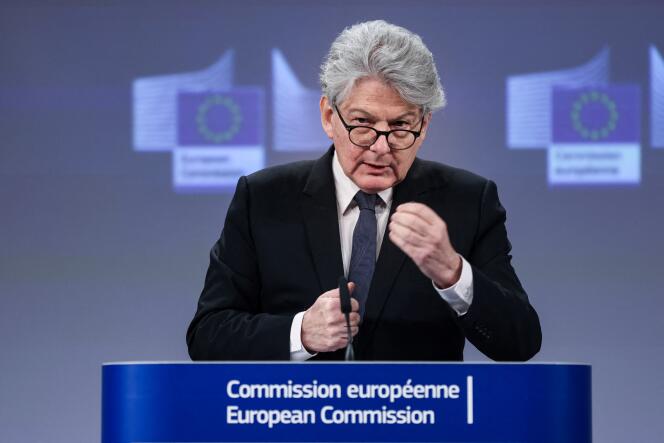


"The DMA [Digital Markets Act] will open the gates to the internet," said Thierry Breton on Wednesday, September 6, with apparent satisfaction and his usual eloquence. The European regulation of digital giants aims to bring "more choice for the consumer, fewer obstacles for smaller competitors," the European commissioner added.
The bill represents an important step forward with the designation of the six major companies concerned: Google, Apple, Meta (Facebook, Instagram, WhatsApp), Microsoft, Amazon and ByteDance (TikTok). The selected firms either have a stock market valuations that exceed €75 billion or sales reaching €7.5 billion in the European Union (EU). In addition to naming the companies targeted, the Commission also specified the 22 services of these companies that will be affected by the bill.
The internet giants now have six months, until March 6, 2024, to propose solutions for complying with the regulation, which aims to enshrine into law the application of principles emanating from long-running antitrust cases that have resulted in fines for Google in particular. Among others, the principles include the prohibition of favoring a company’s own services, the prohibition of cross-referencing customer data between a single company’s services and the obligation to open up to competitors.
Implementing the ambitious regulation, which is unique worldwide, will be a challenge. Apple, Google, Meta, Amazon and Microsoft have already been engaged in a dialog with the Commission for several months. While they have shown general goodwill, they are also putting up resistance on certain points.
When the designation of services was discussed, some of the firms sought to make exceptions. Twenty-two essential services totaling over 45 million users in the EU and 10,000 corporate customers were eventually selected, including Google Search, Apple’s and Google’s mobile environments, Facebook and Instagram.
Microsoft contested the inclusion of its Bing search engine – arguing that it would further strengthen the leader Google Search – as well as that of its Edge browser and advertising management system. Apple, for its part, requested the exclusion of iMessage, which would exempt it from the DMA’s interoperability obligation designed to enable communication between messaging services such as WhatsApp, Instagram and TikTok. Apple argued that interoperability would weaken the security of iMessage.
The Commission agreed to open a market investigation to assess the granting of possible exemptions. In addition, the executive body has already accepted Google and Microsoft’s request to exclude the Gmail and Outlook e-mail apps, in part because they do not function as "gatekeepers" between corporate customers and end-users. Phone manufacturer Samsung's browser as well as virtual assistants such as Siri, Alexa and Google Assistant were also excluded. However, the Commission launched another investigation to determine whether to exclude Apple’s iPad tablet environment from the DMA.
You have 63.45% of this article left to read. The rest is for subscribers only.
